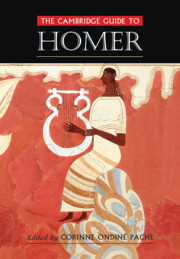Book contents
- The Cambridge Guide to Homer
- The Cambridge Guide to Homer
- Copyright page
- Contents
- Figures
- Notes on the Contributors
- General Introduction
- Part I Homeric Song and Text
- Introduction
- Homeric Epic in Performance
- Homeric Poetics
- Homer in a World of Song
- Epic Traditions
- Mythic Background
- The Language of Homer
- From Song to Text
- Key Topics
- Achilles
- Ancient Near Eastern Epic
- Batrakhomuomakhia (The Battle of Frogs and Mice)
- Catalogues
- Dreams
- Early Editions
- Ekphrasis
- Epic Cycle
- Epithets
- Formula
- Gods and Goddesses
- Hesiod and Homer
- Home
- Homer and Indo-European Myth
- Homer and the Alphabet
- Homeric Body and Mind
- Homeric Dialects
- Homeric Humor
- The Homeric Hymns
- Homeric Scholia
- Hospitality
- The Iliad: An Overview
- Immanence
- Kleos
- Lament
- Margites
- Meter
- Narrative
- Odysseus
- The Odyssey: An Overview
- Panathenaia
- Panhellenism
- Pisistratus
- Rhapsodes and the Homēridai
- Ring Composition
- Similes
- Speech
- Trojan Horse
- Troy
- Type Scene
- Part II Homeric World
- Part III Homer in the World
- Bibliography
- Index
Achilles
from Key Topics
Published online by Cambridge University Press: 22 February 2020
- The Cambridge Guide to Homer
- The Cambridge Guide to Homer
- Copyright page
- Contents
- Figures
- Notes on the Contributors
- General Introduction
- Part I Homeric Song and Text
- Introduction
- Homeric Epic in Performance
- Homeric Poetics
- Homer in a World of Song
- Epic Traditions
- Mythic Background
- The Language of Homer
- From Song to Text
- Key Topics
- Achilles
- Ancient Near Eastern Epic
- Batrakhomuomakhia (The Battle of Frogs and Mice)
- Catalogues
- Dreams
- Early Editions
- Ekphrasis
- Epic Cycle
- Epithets
- Formula
- Gods and Goddesses
- Hesiod and Homer
- Home
- Homer and Indo-European Myth
- Homer and the Alphabet
- Homeric Body and Mind
- Homeric Dialects
- Homeric Humor
- The Homeric Hymns
- Homeric Scholia
- Hospitality
- The Iliad: An Overview
- Immanence
- Kleos
- Lament
- Margites
- Meter
- Narrative
- Odysseus
- The Odyssey: An Overview
- Panathenaia
- Panhellenism
- Pisistratus
- Rhapsodes and the Homēridai
- Ring Composition
- Similes
- Speech
- Trojan Horse
- Troy
- Type Scene
- Part II Homeric World
- Part III Homer in the World
- Bibliography
- Index
Summary
A view of Achilles from inside the value system of Homeric epic, including the significance of his name (original meaning: “who has grief or akhos for the people or lāos”) and that of his best friend and body double, Patroklos (original meaning: “who has the glory or kleos of the ancestors”). Achilles’ trajectory from cosmic anger (mēnis) and debilitating alienation to friendship (philotēs) and death makes him into a person who embraces his accelerated destiny, reflects most deeply and lucidly on the human condition, and becomes the “best of the Achaeans,” the hero who wins the kleos “everlasting fame or epic song” that is Homeric poetry’s self-serving ultimate value.
- Type
- Chapter
- Information
- The Cambridge Guide to Homer , pp. 99 - 102Publisher: Cambridge University PressPrint publication year: 2020

